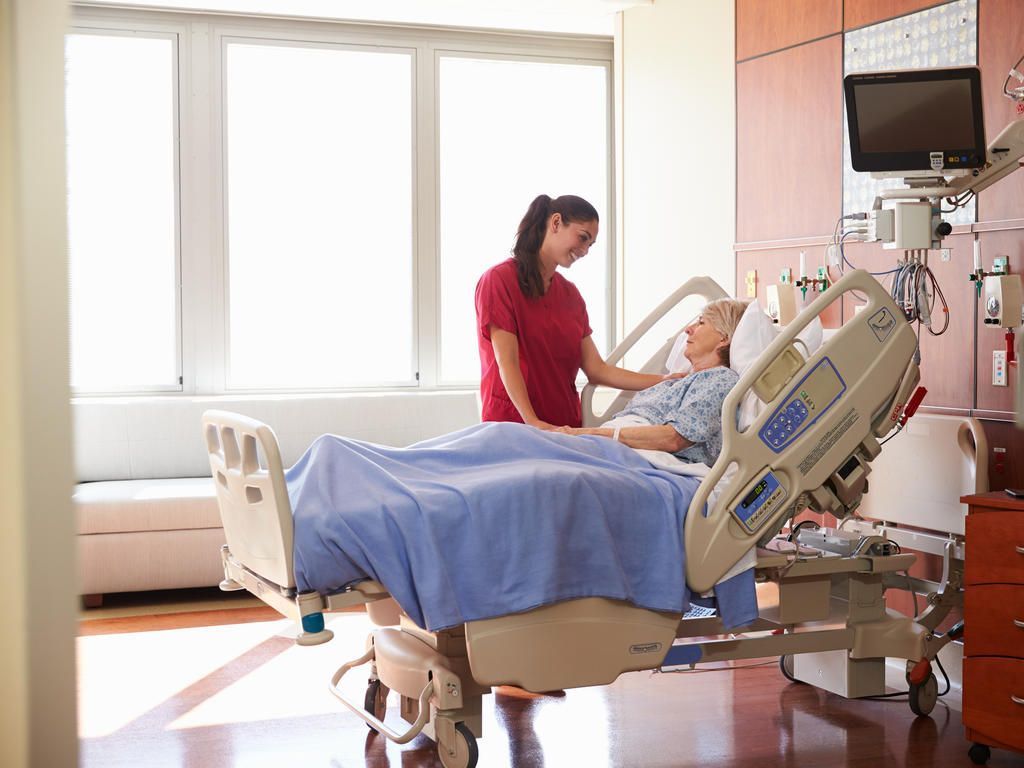Active listening is not a skill that is easily acquired, but when combined with compassion it makes all the difference for those facing recovery from surgery or a long-term illness. This is the goal of the Methodist Hospital Chaplaincy Internship, where Rhodes students learn to listen to and comfort hospitalized patients at Methodist North and Methodist University Hospital. The internship helps train students to be compassionate listeners, says Chaplain Dennis McDuffie, a part-time instructor in the Rhodes Department of Religious Studies and internship supervisor.
Georgia Harris, a senior religious studies major, participated in the chaplaincy internship her sophomore year, and when it sparked her interest in health care, she decided to pursue a minor in urban community health. Harris worked under McDuffie’s guidance at Methodist North for three hours a week and then met weekly with the other interns who shared their experiences about patients’ care and needs.
Stationed in the geriatric and cardiac wings, Harris often found herself listening to patients’ lengthy stories about their lives. “A lot of conversations were about how people felt lonely and burdensome to their families,” which Harris says showed her the value of going into situations with compassion and being an advocate for others. With one patient who had just suffered from a heart attack, Harris adds she had a nearly three-hour conversation about their common interest in theology.
Junior chemistry major Andy Nguyen went into his semester internship last spring with the expectation that it would give him more clinical experience to help him on his pre-med journey, but ultimately he found that it helped him better empathize with people. Nguyen, who interned at the Methodist University location, was supervised by Chaplain Johnathan Lewis, who teaches the internship course in tandem with McDuffie.
Although many students express that they gain new and valuable skills, they also experience some challenges during the internship. Natey Kinzounza, senior religious studies major, worked at the Methodist University location and took the class with Nguyen last spring. Kinzounza says the most difficult part about the internship was being vulnerable enough to open up about her own struggles in order to empathize, but believes she is now the better for it. She hopes to use her compassionate listening tools as she plans to pursue law after graduation.
McDuffie says that Rhodes partnered with Methodist Healthcare sometime in the late 1970s under Professor Fred Neal to create an internship that would accompany Neal’s Pain, Suffering, and Death course and emphasize basic human interaction skills with patients and family members at a hospital. Chaplain Craig Jordan became the internship supervisor in 1984 and instructor of the Pain, Suffering and Death course after Neal retired. McDuffie was invited as a co-supervisor for the internship in 1998, and today, he serves as the sole supervisor while Jordan—who retired from Methodist Healthcare in 2008— continues to teach the Pain, Suffering and Death course.
While chaplains serve varying roles, Methodist Hospital chaplains are open to meet the spiritual needs of patients and their families during the troubling times of illness, surgery, and grief, according to McDuffie. Their aim is not to cater to one denomination, but rather to be a source of spiritual and emotional support to those who need it.
The Rhodes/Methodist Hospital Internship has been designed to assist students in experiential learning about patient care and interpersonal relationships. McDuffie says he has heard time and time again from patients that they are grateful for the time spent with the Rhodes students. “If we communicate our interest and concern, most patients respond with a willingness to share their story,” he says.
By Lizzie Choy ’17
